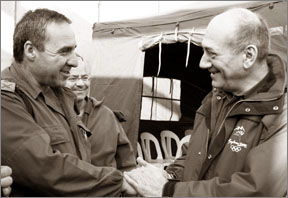|
observer |
|
|
|
|
|
OTHER LINKS |

|

|

|
Could a country park bring peace to Middle East?Israeli and Syrian representatives have drawn up a secret blueprint that would overcome one of the main stumbling blocks to Middle East peace.
Under the plan, Israel would withdraw from the Golan Heights, which would revert to Syria. But Israelis would be allowed free access to the most hotly contested area on the shore of the Sea of Galilee, which would become a conservation and tourist park. In return, Syria would end its support for militant groups such as Hezbollah, Hamas and Islamic Jihad, and end more than 50 years of war. Israel has occupied the strategic Golan Heights since 1967 and resolving the status of the territory has been the Holy Grail of the Middle East peace process. Negotiations about the land-for-peace deal, details of which appeared in the Israeli Haaretz newspaper yesterday, took place in a third country, possibly Spain. But both Israeli and Syrian governments denied sanctioning the talks. Ehud Olmert, the Israeli Prime Minister, described them as "the private initiative of a man who spoke only for himself", adding: "This isn't serious or honourable or worthy of any further comment." The Syrian Foreign Ministry was equally dismissive, saying the report was "absolutely baseless". However, Israeli, Syrian and British sources confirmed that unofficial channels existed between Israel and many of its most implacable enemies. Exactly this sort of secret dialogue, officially deniable by all sides, led to the Oslo peace accords in the early 1990s. An Israeli Government source added weight to suggestions that the Golan Heights plan had come from just such a back channel, telling The Times that such contacts might not be routine, but were not uncommon. The Israeli side was represented by Alon Liel, a former Foreign Ministry director general. He was joined by Ibrahim Suleiman, a Syrian-American businessmen, and an unnamed European mediator. The mediator and Mr Suleiman reportedly held eight meetings with figures close to President Assad, including the Vice-President, the Foreign Minister and a general in the intelligence services. The meetings, conducted over the past two years, apparently took place with the knowledge of senior officials in the governments of Ariel Sharon and Mr Olmert. The last session took place during the war in Lebanon last summer. Dr Liel told Haaretz: "We insisted on making the existence of meetings known to the relevant parties. Nonetheless, there was no official Israeli connection to the content of the talks." The paper suggests that both sides of the border would be demilitarised and a buffer zone established along the eastern shores of the Sea of Galilee. Israelis would be able to go there without Syrian control or approval. This would satisfy Syrian demands for the full return of the Golan, while addressing Israeli concerns over its main water source and security. Samir al-Taqi, a Syrian expert on Arab-Israeli affairs, said that the details highlighted how the technical issues involved in the dispute over the Golan could be resolved. "If the Israelis and Syrians sat down together, I do not think they would need more than three months to resolve this problem," he told The Times. President Assad has made overtures to Israel recently, but Mr Olmert has said that talks cannot take place until Syria ends its support for Palestinian militants and Hezbollah, and scales back its alliance with Iran. Experts in the region believe that Mr Olmert is too weak to launch an initiative on the Syrian track, particularly after the collapse of peace efforts with the Palestinians. Direct talks with Damascus would also likely cause friction with Israel's most important ally the US. Washington accuses Syria of harbouring terrorists and President Bush has rejected calls to engage the country in dialogue. NYTimes |











